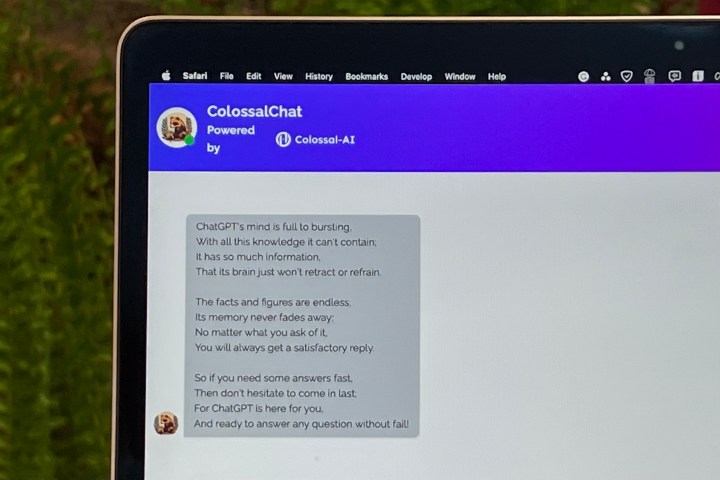The first open-source AI chatbot in the vein of ChatGPT has arrived, and it’s come at a particularly helpful time. ColossalChat is a powerful alternative that uses an RHLF pipeline similar to OpenAI’s GPT-4 model that powers ChatGPT, and it’s available for immediate use.
ChatGPT, of course, remains the premier AI chatbot and keeps plenty busy. But I just tried to log in now and found it was at capacity and, therefore, unavailable. This is a common problem with the service. ColossalChat, on the other hand, is wide open and ready to use for free.

This new AI chatbot can write code, respond intelligently to requests, and converse like OpenAI’s solution. You can try it out at chat.colossalai.org for free, and you don’t even need to log in or create an account.
A quick test of ColossalChat’s safeguards revealed that it has some, but it is more relaxed than ChatGPT. It didn’t want to talk about bombs, yet it did share advice about cheap cigarettes.
According to a Medium post by one of its developers, Yang You, ColossalChat’s Coati large language model is based on LLaMA, Meta’s open-source large language model, then refined to respond in a way that is more like ChatGPT. In fact, You exclaims that ColossalChat is “the closest project to the original technical route of ChatGPT.”
LLaMA can be used directly if you can build the project on your computer. However, its results won’t be quite as engaging as those of ChatGPT or Colossal.
RHLF is an essential feature of ColossalChat and ChatGPT. It means reinforcement learning from human feedback, similar to how animals are taught to perform tricks. When the AI response is appropriate, it’s rewarded, which helps the network understand human preferences.
It’s too soon to know if ColossalChat is comparable to ChatGPT’s latest release, which used GPT-3.5 and could only process text. OpenAI’s latest update brings multimodal input, allowing images to be uploaded to help visually inform the chatbot about what you are trying to do or the question you are asking.
Microsoft’s BingChat is another ChatGPT alternative, and it uses GPT-4 for text input and responses. Bing Chat can also generate images now, via a feature called Bing Image Creator.
It’s unlikely that ColossalChat will surpass ChatGPT in breadth or capabilities, or in popularity, but it’s good to have alternatives, especially when ChatGPT hits capacity.



